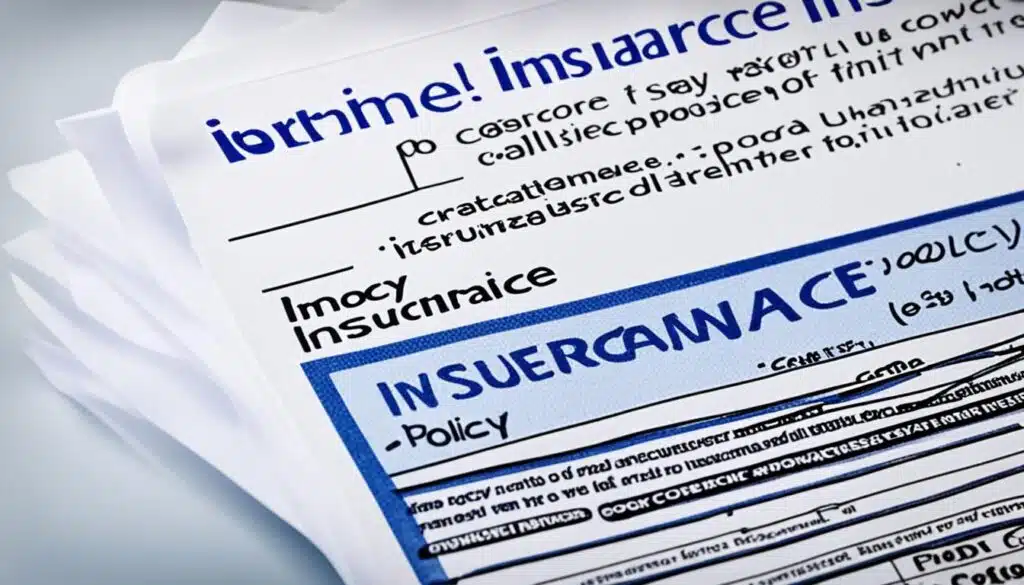Income Protection Insurance Coverage is a valuable tool for securing your salary and offering peace of mind in the face of unforeseen illness or injury. This type of coverage serves as a safety net, providing a replacement source of income when you are unable to work for a specified period.
Whether you’re facing a temporary setback or a more prolonged disability, income protection insurance can help you maintain financial stability during challenging times. By understanding the key features, eligibility criteria, and coverage options, you can make informed decisions to protect your income and secure a more stable financial future.
Key Takeaways:
- Income Protection Insurance offers a replacement source of income if you can’t work due to illness, injury, or disability.
- Eligibility for coverage includes being employed full-time or self-employed with a wage.
- Features of income protection insurance may include a guaranteed premium option, portability if you change jobs, and the ability to increase coverage over time.
- Income protection insurance is beneficial for anyone in full-time employment, providing regular income during periods of inability to work.
- When considering coverage, calculate the appropriate level of income protection based on essential bills, mortgage payments, and living expenses.
What is Income Protection Insurance?
Income Protection Insurance is a valuable policy that serves as a replacement source of income in case you are unable to work due to illness, injury, or disability for a specified period. This insurance acts as a financial safety net, providing you with peace of mind and offering supplementary income during challenging times.
Life is unpredictable, and unexpected circumstances such as illness or injury can significantly impact your ability to work and earn a consistent salary. Income Protection Insurance steps in to bridge the gap and ensure that you have a steady stream of income to cover your essential expenses and maintain financial stability.
Imagine a scenario where you are unable to work due to an unfortunate accident or a prolonged illness. Without income protection insurance, you could face significant financial hardships, struggling to pay bills, meet mortgage payments, or cover your everyday living expenses. However, with this insurance policy, you can have peace of mind knowing that you have a reliable replacement source of income that allows you to focus on your recovery and well-being.
How Does Income Protection Insurance Work?
When you take out an income protection insurance policy, you are essentially creating a safety net that kicks in when you are unable to work. In the event of illness, injury, or disability, your insurance provider will pay you a regular income to replace the portion of your salary that you would have earned if you were working.
This replacement income typically amounts to a percentage of your usual earnings, often up to 75%. This ensures that you have enough financial support to cover your essential expenses and maintain a decent standard of living while you are unable to work. The specific terms and conditions of the policy, including the waiting period before benefit payments begin and the duration of coverage, will be outlined in the policy documents.
Why Should You Consider Income Protection Insurance?
Income Protection Insurance is an essential consideration for anyone who relies on their regular income to meet financial commitments and maintain their lifestyle. Whether you are an employee or self-employed, income protection insurance provides a safety net to protect your financial well-being in uncertain times.
With income protection insurance, you can safeguard your income and ensure that you have a replacement source of funds to cover your essential bills, mortgage payments, and living expenses should you be unable to work due to illness, injury, or disability. It offers you financial security, allowing you to focus on your recovery and take the necessary steps to get back on your feet.
Furthermore, income protection insurance is also a wise choice for individuals who want to secure their financial future and ensure continuous coverage despite potential future claims. By paying attention to your individual needs and circumstances, you can choose the right income protection insurance policy that aligns with your requirements and provides you with peace of mind.
Eligibility for Income Protection Insurance
If you’re looking to secure your income and protect yourself against unforeseen circumstances, an income protection policy may be the right solution. But who is eligible for such coverage? Let’s explore the criteria.
Employed Full-Time
If you are employed full-time, working more than 16 hours per week, you meet the criteria for an income protection policy. Whether you work in a corporate setting or have a permanent position with a small business, this policy can provide a safety net to protect your income in case of illness, injury, or disability.
Self-Employed with a Wage
If you are self-employed and earn a wage, you are also eligible for income protection insurance. Being self-employed comes with its own set of risks, as your income may fluctuate depending on the success of your business. In this case, having an income protection policy can help you maintain financial stability even during difficult times.
By meeting either of these criteria, you can ensure that you have the necessary coverage to safeguard your income. Don’t wait until it’s too late. Protect your financial future today with an income protection policy.
| Who is Eligible? | Requirements |
|---|---|
| Employed Full-Time | Working more than 16 hours per week |
| Self-Employed | Earning a wage |
Key Features of Income Protection Insurance
When considering income protection insurance, it’s essential to be aware of the key features that this type of policy offers. Understanding these features will help you make an informed decision about whether it’s the right option for you. Let’s take a closer look at four significant aspects of income protection insurance:
1. Guaranteed Premium Option
One of the standout features of income protection insurance is the guaranteed premium option. With this option, the cost of your insurance remains fixed throughout the policy’s duration, providing you with peace of mind that your premiums won’t increase unexpectedly. This predictability allows you to budget and plan for your coverage effectively.
2. Income Replacement
“**Income replacement** of up to 75% of your income.”
A core function of income protection insurance is to provide you with a replacement source of income if you’re unable to work due to an illness, injury, or disability. Depending on the terms of your policy, you may be eligible to receive up to 75% of your regular income. This ensures that you can continue to meet your financial obligations and maintain your standard of living during challenging times.
3. Portability
For individuals who change jobs within the European Union, portability is a valuable feature of income protection insurance. It means that you can take your coverage with you, rather than having to purchase a new policy. This ensures that even if your work situation changes, you can still rely on your income protection policy to provide financial support when needed.
4. Coverage Increase
Income protection insurance also offers the opportunity to increase your coverage over time. Every three years, without the need for additional medical assessments, you can increase the level of coverage provided by your policy. This ensures that your protection keeps up with your changing circumstances and provides adequate support when you need it most.
By understanding these key features, you can determine if income protection insurance aligns with your needs and goals. Evaluating factors such as the guaranteed premium option, income replacement, portability, and coverage increase will help you make an informed choice about securing your financial future.
| Key Features of Income Protection Insurance | Summary |
|---|---|
| Guaranteed Premium Option | The cost of insurance remains fixed throughout the policy duration. |
| Income Replacement | Provides up to 75% of your income as a replacement source. |
| Portability | Can be transferred when changing jobs within the European Union. |
| Coverage Increase | Allows for increasing the coverage every three years without additional medical assessments. |
Who Should Consider Income Protection Insurance?
Income Protection Insurance is suitable for anyone who meets the eligibility criteria, including individuals aged 18-54 in full-time employment or self-employment. It is beneficial for those in need of **regular income** if they cannot work due to an illness or injury, with a specific **waiting period** before benefit payments begin. It is also useful for individuals looking to enhance their coverage in the **future** and those who want continuous cover regardless of the number of claims made.
Benefits of Income Protection Insurance
- Provides a safety net for individuals in **full-time employment** or self-employment, ensuring they have a **regular income** if unforeseen circumstances prevent them from working.
- Offers **peace of mind** and financial security during challenging times, such as when faced with an illness or injury that inhibits the ability to earn a living.
- Allows policyholders to focus on recovery without worrying about financial strain, as income protection insurance can bridge the gap between income loss and recovery.
- Ensures continuity of **future coverage** by allowing individuals to enhance their policy as their needs change over time.
Case Study: Sarah’s Experience
“As a freelance graphic designer, I rely heavily on my income to pay for daily expenses and support my family. When I broke my wrist and couldn’t work for several months, my income came to a halt. Luckily, I had income protection insurance, which provided me with a monthly benefit that allowed me to cover essential bills and maintain a certain quality of life. The waiting period was initially challenging, but once the payments started, it brought me immense relief. I highly recommend income protection insurance for anyone who wants to protect their income and ensure financial stability in times of need.”
Income Protection Insurance provides peace of mind and a **secure salary** for individuals in full-time employment or self-employment. Whether you’re a young professional starting your career or a seasoned entrepreneur, income protection insurance offers valuable benefits that can provide financial stability when illness or injury strikes. Don’t leave your financial future to chance – consider income protection insurance as a crucial component of your overall financial plan.
Summary of Who Should Consider Income Protection Insurance
| Who? | Why? |
|---|---|
| Full-time employees | Avoid income loss due to illness or injury |
| Self-employed individuals | Secure regular income during periods of disability |
| Individuals aged 18-54 | Ensure coverage during prime earning years |
| Individuals looking for future coverage | Enhance policy as needs change over time |
- **Suitable for anyone** in need of a financial safety net, regardless of occupation or income level
- Ideal for individuals seeking **full-time employment** or who are self-employed, as it helps ensure a **regular income**
- Beneficial for those willing to bear a **waiting period** before benefit payments begin
- Provides the option to enhance coverage for **future protection**, catering to changing needs and circumstances
Determining the Right Amount of Income Protection
When it comes to income protection insurance, finding the right level of coverage is crucial. The appropriate level of income protection depends on your unique financial situation and goals. It’s essential to consider factors such as essential bills, mortgage payments, and living expenses to ensure you have adequate coverage.
One key factor to consider is the percentage of your income you want to protect. In general, income protection insurance allows you to cover up to 75% of your salary. However, the ideal percentage may vary depending on your specific circumstances.
Start by assessing your essential bills and other financial obligations. These can include utility bills, loan repayments, and childcare expenses. Calculate the total amount needed to cover these bills each month.
Next, consider your mortgage payments. If you have a mortgage, you’ll want to make sure your income protection covers the monthly payments. Determine the amount needed to cover your mortgage each month.
Don’t forget to factor in your living expenses as well. These can include groceries, transportation costs, and entertainment expenses. Calculate an estimate of your monthly living expenses.
Once you have a clear picture of your essential bills, mortgage payments, and living expenses, you can make an informed decision about the percentage of your income to protect with income protection insurance. Remember, it’s important to strike a balance. You want to ensure you have enough coverage to meet your financial obligations, but you don’t want to pay for more coverage than you actually need.
Analyze your financial situation and consider how much financial support you would require if you were unable to work due to illness, injury, or disability. This assessment will help you determine the right level of income protection coverage to secure your financial stability and provide peace of mind.
Factors to Consider When Determining the Right Amount of Income Protection
| Factors | Description |
|---|---|
| Essential Bills | Calculate the total amount needed to cover bills such as utilities, loan repayments, and childcare expenses. |
| Mortgage Payments | Determine the amount needed to cover your monthly mortgage payments. |
| Living Expenses | Estimate your monthly living expenses, including groceries, transportation costs, and entertainment expenses. |
| Financial Obligations | Consider any other financial obligations, such as student loan repayments or credit card bills. |
| Income Percentage | Decide on the percentage of your income you want to protect with income protection insurance. |
Cost of Income Protection Insurance
When considering income protection insurance, it’s important to understand the factors that influence its cost. Various elements, such as age, health, occupation, and level of coverage, impact the premiums you can expect to pay.
Your age plays a significant role in determining the cost of insurance. Generally, younger individuals enjoy lower premiums as they are considered to be at a lower risk of illness or injury. On the other hand, older individuals may face higher premiums due to a higher likelihood of health issues.
Health is another crucial factor affecting insurance costs. Insurance providers typically assess an applicant’s health condition and medical history to determine the level of risk involved. Individuals with pre-existing medical conditions may face higher premiums due to the increased likelihood of them needing to make a claim.
The nature of your occupation can also impact the cost of income protection insurance. Certain occupations, such as those that involve higher physical risks or exposure to hazardous environments, may lead to higher premiums. This is because the likelihood of an injury or illness affecting your ability to work may be greater in these professions.
Lastly, the level of coverage you choose will influence the cost of insurance. A higher level of coverage, which offers a higher percentage of income replacement in the event of disability, may result in higher premiums. It’s important to carefully consider your financial needs and the level of protection you require when selecting coverage options.
Remember, while the cost of insurance is an important consideration, it should not be the sole factor when choosing income protection coverage. It is crucial to strike a balance between affordability and adequate coverage to ensure financial security in times of need.
By understanding how age, health, occupation, and level of coverage affect the cost of income protection insurance, you can make informed decisions that align with your financial goals and needs.
Coverage for Mental Health Conditions
Income protection insurance goes beyond providing financial support for physical illnesses and injuries. It also offers coverage for mental health conditions, ensuring that individuals facing mental illnesses can receive the necessary support if they are unable to work.
“Mental health conditions are just as critical as physical ailments, and income protection insurance acknowledges this by offering coverage for individuals experiencing mental health challenges,” says Dr. Elizabeth Thompson, a renowned psychologist. “This coverage ensures that individuals struggling with mental illnesses can focus on their recovery without worrying about their income.”
Mental health conditions can significantly impact an individual’s ability to work, taking a toll on their overall well-being and financial stability. Income protection insurance recognizes the importance of mental health and provides a safety net for those facing mental illnesses, such as depression, anxiety, bipolar disorder, or post-traumatic stress disorder.
With the coverage for mental health conditions, individuals can access financial support if they need to take time off work to focus on their mental health or undergo necessary treatments. This support not only relieves the financial burden but also allows individuals to prioritize their well-being and recovery.
It is important to note that coverage for mental health conditions may vary depending on the specific policy and insurance provider. Some policies may have certain limitations or waiting periods before benefits related to mental health conditions can be claimed.
By including coverage for mental health conditions, income protection insurance demonstrates the growing recognition of the importance of mental well-being in overall health and work productivity. It offers individuals the peace of mind and financial stability they need to navigate their mental health challenges while ensuring their income is protected.
Next, let’s explore the factors to consider when deciding whether you need income protection insurance.
Do You Need Income Protection Insurance?
Income protection insurance is essential for individuals who want to secure their income in case they are unable to work due to illness, injury, or disability. It provides a safety net that ensures you have financial support during challenging times, allowing you to focus on your recovery and maintain peace of mind.
If you are self-employed, income protection insurance becomes even more crucial. Unlike employees, self-employed individuals do not have the benefit of sick leave or paid time off. Without a secure salary, a period of inability to work could have a severe impact on your finances. Having income protection insurance can help alleviate the financial burden and provide the necessary funds to cover essential expenses.
Individuals with dependents who rely on their income also have a strong need for income protection insurance. If you have family members, such as a spouse or children, who are financially dependent on you, an interruption in your income due to illness or injury can create significant financial strain for them as well. Income protection insurance ensures that you have a regular income stream, even if you are unable to work, providing stability for your loved ones during difficult times.
Furthermore, income protection insurance is valuable for those with significant financial commitments. If you have mortgage payments, loans, or other financial obligations that require a steady income, losing your ability to work can quickly jeopardize your financial stability. Income protection insurance offers a reliable source of income, allowing you to meet your financial obligations and maintain your lifestyle.
Ultimately, income protection insurance is a proactive step towards securing your financial future. By ensuring that you have a safety net in place, you can face unforeseen circumstances with confidence, knowing that you have the necessary financial support. Whether you are self-employed, have dependents, or have significant financial commitments, income protection insurance provides the financial security you need to navigate challenging times.
Note: The image above represents the importance of income protection insurance in securing your financial stability.
Coverage for Redundancy
When considering income protection insurance, it’s important to understand the coverage provided by your policy. While income protection insurance covers loss of income due to illness or injury, it does not typically cover redundancy. This means that if you find yourself without a job due to redundancy, your income protection policy may not provide financial support in this scenario.
Income protection insurance is specifically designed to provide a replacement source of income in the event that you are unable to work due to illness, injury, or disability. It acts as a financial safety net, offering peace of mind by covering a portion of your income to help you meet your financial obligations during difficult times.
While redundancy can also result in a loss of income, it is generally not covered under income protection insurance policies. Redundancy is typically a separate type of insurance coverage, and if you are concerned about job security, it may be worth exploring redundancy insurance options or other forms of financial protection.
When reviewing your income protection insurance policy, it’s essential to carefully read the terms and conditions to understand the specific coverage provided. If you have any questions or concerns about what is covered under your policy, it’s always best to reach out to your insurance provider directly for clarification.

Multiple Claims and Deferred Period
When it comes to income protection insurance, it’s important to understand the concept of multiple claims and the deferred period. These two factors play a crucial role in determining the time between your inability to work and when benefit payments begin.
Income protection policies allow for multiple claims. This means that if you experience a relapse of the same illness or condition, you won’t need to serve the deferred period again. However, if it’s a different illness or condition, the deferred period must be served before benefit payments can commence.
The deferred period, also known as the waiting period, is the time between when you become unable to work and when the benefit payments start. It is a predetermined period specified in your insurance policy. During this time, you will not receive any income protection benefits.
The length of the deferred period varies depending on your policy and personal preferences. It can range from a few weeks to several months. Keep in mind that a shorter deferred period generally results in higher premiums.
Before deciding on the length of your deferred period, carefully consider your financial situation. Evaluate factors such as your savings, emergency funds, and other sources of income that may be available during the deferred period.
Understanding the time between your inability to work and benefit payments is essential for proper financial planning. It allows you to assess your needs during this period and make the necessary arrangements to ensure your financial stability.
To further illustrate the concept, consider the following table:
| Deferred Period | Multiple Claims |
|---|---|
| 4 weeks | Allowed |
| 8 weeks | Allowed |
| 12 weeks | Allowed |
As seen in the table above, regardless of the length of the deferred period, multiple claims are allowed. This means that should you experience a relapse of the same illness, you won’t need to serve the deferred period again.
Also Read:- Find the Best Car Insurance in California Today
Having a clear understanding of multiple claims and the deferred period will help you make informed decisions when selecting an income protection insurance policy. Take the time to review and compare different policies to ensure you choose the one that best suits your needs and financial circumstances.
Conclusion
Income protection insurance is an essential tool to safeguard your income during challenging times caused by illness, injury, or disability. By understanding the features, eligibility criteria, coverage options, and claiming process of income protection insurance, you can make informed decisions to protect your income and secure your financial future.
With income protection insurance, you have the peace of mind that comes from knowing you will have a replacement source of income if you are unable to work. It acts as a financial safety net, providing you with the necessary funds to cover essential expenses such as bills, mortgage payments, and living expenses.
Remember to consult with a financial advisor who can guide you through the process and provide personalized advice based on your specific circumstances. They can help you determine the right amount of coverage and ensure that you have the necessary safeguards in place to protect your income and secure your financial future.
FAQs
A: Income protection insurance is a type of insurance policy that provides you with a regular income if you are unable to work due to illness or injury.
Q: How does income protection insurance work?
A: Income protection insurance replaces a portion of your income if you are unable to work due to illness or injury. The benefit amount is usually a percentage of your gross annual income.
Q: What is the benefit period in income protection insurance?
A: The benefit period is the length of time for which you will receive payments from your income protection insurance policy if you are unable to work. It can range from a few years to until your retirement age.
Q: What is the difference between income protection insurance and critical illness insurance?
A: Income protection insurance provides a regular income if you are unable to work due to illness or injury, while critical illness insurance pays out a lump sum if you are diagnosed with a specific critical illness listed in the policy.
Q: How do I make a claim on my income protection insurance policy?
A: To make a claim on your income protection insurance policy, you need to contact your insurer directly and provide them with the necessary documentation, such as medical certificates and proof of income loss.
Q: How do I determine the level of cover I need for income protection insurance?
A: The level of cover you need for income protection insurance depends on your monthly expenses, financial commitments, and savings. A financial adviser can help you calculate the appropriate level of cover for your individual situation.
Q: What are common exclusions in income protection insurance policies?
A: Exclusions in income protection insurance policies vary between insurers but may include pre-existing medical conditions, self-inflicted injuries, drug or alcohol-related illnesses, and certain high-risk occupations.









